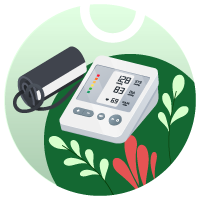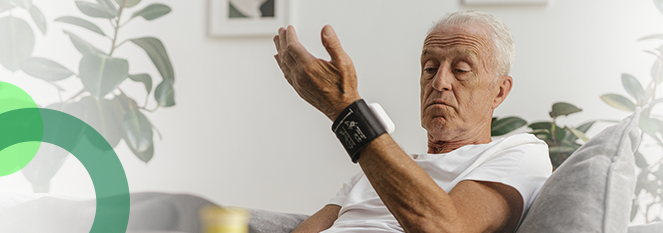Overview
- High blood pressure hypertension) means that the pressure of blood in your blood vessels is too high and unhealthy.
- Low blood pressure (hypotension) causes dizziness and fainting, and in severe cases can be life-threatening.
- Healthy blood pressure signs and symptoms are not constant. It varies from one person to other.
- Lifestyle and dietary changes can also help you control your BP effectively. But should be done according to the advice of a doctor.
- To maintain healthy blood pressure, you should follow the doctor's instructions and take your medications.


Your blood flowing in these vessels exerts pressure on the wall of the vessels when it flows. The degree of this pressure varies throughout the day. However, if this pressure starts to climb regularly to a dangerous level, you can be diagnosed with high blood pressure.
High blood pressure can mean an increased risk for issues, such as cardiovascular diseases, heart attack, and stroke.
What Are Symptoms of High Pressure?
There are no clear symptoms of BP problem that will indicate that you are having this issue. High blood pressure is often a silent condition. It can take years before the condition becomes worse enough to present symptoms.
However, some signs of severe hypertension might be seen as follows:
- Shortness of breath
- Nosebleeds
- Dizziness
- Chest pain
- Problems with sight
- Hypertension headache
- Flushing
- Urine containing blood
Causes of High Blood Pressure
There are two types of high blood pressure issues or hypertension.
| Type | Causes |
| Primary hypertension | This type of high blood pressure develops over time. According to scientists, a blend of causes can contribute to increased blood pressure this way, like:
|
| Secondary hypertension | Secondary hypertension develops quickly. It is more severe than primary hypertension. The conditions that may cause secondary hypertension can include:
|
Understanding Blood Pressure Readings
Healthy blood pressure varies from person to person. Your doctor will advise you about what your ideal pressure depends on, including overall health.
The following readings are imperative when it comes to measuring the blood pressure of any individual:
| Diagnosis | Systolic | Diastolic |
| Low | Under 90 | Under 60 |
| Optimal | Under 120 | Under 80 |
| Normal | 120 to 129 | 80 to 84 |
| High Normal | 130 to 139 | 85 to 89 |
| High | Above 140 | Above 90 |
High Blood Pressure Treatment
High blood pressure treatment depends on several factors and can change over time as your doctor sees fit.
- Medications
- Angiotensin-converting enzyme inhibitors
- Calcium channel blockers
- Thiazide diuretics
- Beta-blockers
- Renin-inhibitors
- Diet
- Plant-based diet
- Food low in sodium content and salt
- Low intake of saturated fats and trans fats
- Low-fat dairy products
- Moderate alcohol use
- Moderate caffeine use
Several medications use to control your blood pressure. These can include:
Dietary changes in people with hypertension are essential. To control your blood pressure, you may switch to:
What Is Low Blood Pressure (Hypotension)?
Hypotension is when blood pressure is much lower than expected (90/60 mm/Hg). It can occur either as a condition or a symptom of a range of conditions. It may not cause any symptoms - but it needs proper medical attention.
What Are Symptoms of Low Pressure?
For some people, hypotension signals an underlying problem when it drops suddenly. Signs and symptoms of low blood pressure include:
- Dizziness
- Fainting
- Blurred vision
- Nausea
- Fatigue
- Lack of concentration
Causes of Low Blood Pressure
Medical conditions that causes low blood pressure include:
| Causes | What it Entail |
| Pregnancy | Blood pressure is likely to drop when the circulatory system expands rapidly during pregnancy. It is normal, and blood pressure returns to your pre-pregnancy level after delivery. |
| Heart Problems | Heart conditions such as low bradycardia, heart valve problems, heart attack, and heart failure lead to low blood pressure. |
| Dehydration | When your body loses more water than it takes in, it causes dizziness and weakness. Fever, vomiting, diarrhea, and strenuous exercise can cause dehydration. |
| Blood Loss | Losing blood, such as from a severe injury or internal bleeding, reduces the amount of blood in your body. It leads to a severe drop in blood pressure. |
| Endocrine Problems | Parathyroid, adrenal insufficiency, hypoglycemia, and diabetes can trigger low blood pressure. |
| Infections | When an infection enters the bloodstream, it causes a drop in blood pressure called septic shock. |
Low Blood Pressure Treatment
Low blood pressure that doesn't cause signs or symptoms rarely requires treatment. If it's not clear what causes low blood pressure, the goal is to raise blood pressure and reduce signs and symptoms.
Depending on your age, health, and type of blood pressure, you can control low blood pressure in several ways. You can increase salt in your diet with a doctor recommendation. Drinking more water can help you increase your blood volume and prevent dehydration. Moreover, several medications, fludrocortisone and midodrine, can use to treat low blood pressure.
Yes, if you keep your blood pressure under control with help of medications and other doctor-recommended therapies, you can easily live a healthy life. If blood pressure is left unchecked, it can increase your risk of developing heart disease and stroke.
If your blood pressure is under control and there is not too much internal damage before you got diagnosed, it is very likely to live a healthy and long life. You should follow your doctor’s advice and have periodic checkups along with blood pressure monitoring.
Once you develop hypertension, it cannot be reversed. The best you can do is follow your doctor’s advice and keep it under control with medication and diet strategies.
Foods and drinks that might have too much sodium like salt, frozen food, processed food, snacks, canned foods, or condiments (soy sauce, salad dressings). Foods that have too much fat or calories should also be avoided. You can always ask your doctor or nutritionist for detailed guidance.
Every medication comes with its own set of side effects. Some side effects of blood pressure medication can include nervousness, headaches, nausea, vomiting, skin rash, weight loss or gain, stomach issues, cough, fatigue, or erection issues. Consult your doctor if any symptoms persist long term.
Join Our Newsletter Now
Subscribe to get information about Omni Help
